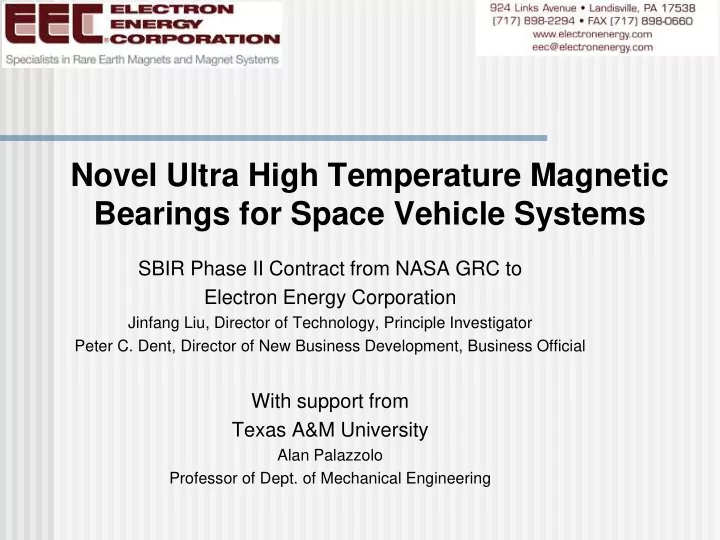

Novel Ultra High Temperature Magnetic Bearings for Space Vehicle Systems SBIR Phase II Contract from NASA GRC to Electron Energy Corporation Jinfang Liu, Director of Technology, Principle Investigator Peter C. Dent, Director of New Business Development, Business Official With support from Texas A&M University Alan Palazzolo Professor of Dept. of Mechanical Engineering
What is a magnetic bearing ? Magnetic device to provide non- contacting support for high-speed rotors using magnetic forces
Current PM Bearings Problem Statement Current roller bearing and squeeze dampener technology limited to 260 degrees C Require cooling air & lubrication Limited in speed Lighter weight, higher efficiency needed Decreased Noise and emissions High temperature dampening not possible with oil or elastomer based dampening technologies Electrical Power required constantly to electromagnets for bearing forces and control
Where Needed NASA, Gov’t & Aerospace Space power Brayton cycle generator components High speed turbines Turbine engines Flywheel power storage Aircraft propulsion Commercial: Natural Gas turbines High speed, high temperature generators
Bearing User’s Needs Operation at higher temperatures Higher speeds desired More Compact, Lighter Higher efficiency Reliable in high stress, high shock environment Harsh space or earth operating environments No cooling, no lubrication Lower power supply requirements
Ultra High Temperature Permanent Magnet (UHTPM) Bearing Innovations Uses EEC’s ultra high temperature, high energy product and high structural strength magnets for majority of static loads Lower ohmic loss homopolar design (not heteropolar) Fault tolerant with catcher bearing back up Compact, Light weight design Reduced need for electronics High speed operation High stiffness High temperature dampening possible Test stand developed for operating in vacuum
UHTPM bearing Specifications EEC’s Ultra high temperature SmCo-UHT TM Permanent magnets employed (US Patent no. 06,451,132) Operation up to 1000 degrees F (522 degrees C) Permanent magnets provide key force with electromagnets used only for control Bearing Weight - 48 lbs Load of 500 lbs axial, 750 lbs radial Operating speed 25,000 rpm Airgap B bias .66 Tesla stiffness K i 41 lbf/in, K p -37000 lb/in
UHTPM Bearing Modeling, Testing, Prototyping UHTPM Bearing finite element model Radial UHTPM Bearing Solid works model of test stand
State of Development Phase I (complete) UHTPM radial only, Bearing Design and magnetic and mechanical FEA Performed Prototype radial only UHTPM built Test stand designed and built and test matrix developed Phase II (current, 62% complete) Designed & optimized w /FEA combo (radial & axial) UHTPM Bearing Bearing Magnet materials delivered and all other material in process or complete Test stand designed, with fabrication and instrumentation in process Controls design complete with fabrication in process Steady state and non-steady state rotor dynamics complete or in process
Further Phase II Development Planned Future Phase II Work Develop a 5 axis controller and improve the dynamics of the rotating assembly utilizing the closed loop electromechanical modeling software Build the power electronics and controller hardware packages for the Full Spin Rig Assemble the improved radial and axial bearings and specialized test fixtures for static load measurement Conduct Force vs. current and temperature tests for the axial and radial bearings Complete Mechanical Design of the High Temperature Motor and 5 Axis Test Rig Build High Temperature Motor and 5 Axis Test Rig Test 5 Axis Test Rig with High Temperature Motor, Magnetic Bearings and Catcher Bearings
Next Steps Technical Readiness Level (TRL) 2 Complete SBIR Phase II Development: December 2007 Update Targeted Commercial Prospects Identify NASA/Government/Aerospace applications and interested entities for further development Seek sites for further testing and evaluation in 2008
Contact Peter C . Dent Electron Energy Corporation 924 Links Ave. Landisville, PA 17538 (717) 898-2294 ph (717) 459-1001 direct (610) 349-5525 cell www.electronenergy.com
Recommend
More recommend